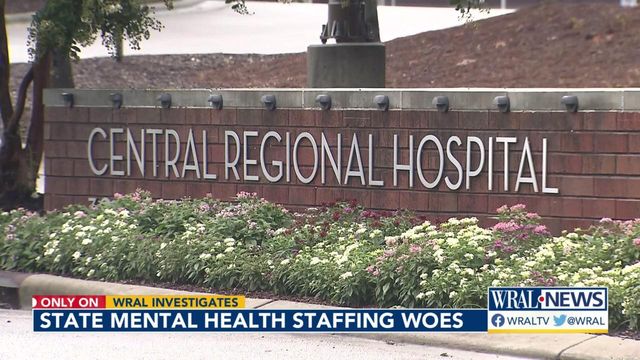'There was staff that had their hair pulled out': Mental health crisis creates strain on NC health care workers
At a time when more people need help than ever, North Carolina simply doesn't have enough therapists and counselors to meet the demand.
Posted — UpdatedFor nearly two years, WRAL Investigates has covered the mental health toll created by the COVID-19 pandemic.
The bottom line is this: At a time when more people need help than ever, the state simply doesn't have enough therapists and counselors to meet the demand.
As WRAL Investigates found, it includes the state's taxpayer funded mental health hospitals, where employees say the worker shortage is lowering morale and raising the danger.
Faizon Cutler works at the state-run Central Regional Hospital in Butner, North Carolina, north of Raleigh.
"It leaves an open door for unpredictable behavior, unpredictable assignments," Cutler said.
The mental health counselor said staffing shortages caused by low pay, low morale and a lack of leadership is failing workers and impacting care provided to patients.
"Staff getting hurt, aggressive behaviors, not being able to detain or de-escalate those behaviors," Cutler said of the daily struggles.
Cutler feels without the proper support staff, small incidents than can normally be handled peacefully can quickly get out of hand.
Central Regional has 1,437 employees, but 449 vacancies, which is nearly 25% vacancy rate. Cutler said the staffing shortages played a role in an attack on him and his coworkers in June.
"The patient started to call us names,” Cutler said. “I got hit in my chest and hit in my back twice.
"Anybody she saw in her way she put her hands on towards them and she did just that ... I got a contusion on my knee, I got cut in my lip ... Two of my co-workers got hurt, two nurses got attacked. One of them is still out."
Cutler and other workers are represented by UE Local 150, a union that shines the light on problems at the hospital, including employee assaults and low pay. Workers also said contractors are used to fill vacancies. Contractors that make more money than full-time, long-time employees and in many cases, Cutler said those workers leave before their contracts run out.
"Staffing and workforce across what I consider the care-giving workforce is a top priority for the department and is a huge issue at our state facilities," Secretary of the North Carolina Department of Health and Human Services Kody Kinsley told WRAL Investigates.
Kinsley worries not only about the 25% vacancy rate, but turnover that means nearly half of staff leave their state health jobs each year.
"We're losing staff to other jobs where they can get a lot more in the market,” Kinsley said.
The staffing issues impact patient care and access to mental health care when the need is at an all-time high. This past July, there were 257 patients at Central Regional, the maximum the hospital could handle based on staffing. That's down from 367 patients in July 2019. When fully staffed, the hospital can handle close to 400 patients, more than any of the other state-run facilities.
Kinsley told WRAL Investigates that he's well aware of the need for help.
“I think every North Carolinian knows that we are in a place of a real mental health crisis,” Kinsley said.
As a result of staff shortages, many patients are waiting in local hospital emergency rooms because beds at Central can't be staffed.
Last month, there were 68 patients on Central's wait list. On average, it took 296 hours to admit them, which is more than 12 days.
Kinsley said losing out on as much as $500 million per month in available Medicaid funding remains a key reason.
"Having not expanded Medicaid now for a decade, that has had a huge impact on our health care workforce and we need to start to change that tide,” Kinsley said. “My main goal is to continue to keep our leaders focused on the most important thing which is our staff and the work that they do for the people that they serve.”
For workers like Cutler, he wishes they were valued more by management and lawmakers.
"Patient care and staff care should be at a level," he said.
Cutler wants lawmakers to understand the shortfalls and in turn, provide more funding to hire new and retain current workers, so those that need mental health care can get it. He said that money will also protect those providing the care.
"There were staff that had their hair pulled out, like literally pulled out from their roots,” Cutler said. “I guarantee you this will not be the last incident when a lot of workers get hurt.”
WRAL Investigates asked state health leaders for data on the number of physical confrontations where either staff or patients were injured to see if the trends are increasing since the pandemic started. Citing confidentiality laws, the North Carolina Department of Health and Human Services refused to provide that information to WRAL Investigates.
• Credits
Copyright 2024 by Capitol Broadcasting Company. All rights reserved. This material may not be published, broadcast, rewritten or redistributed.






